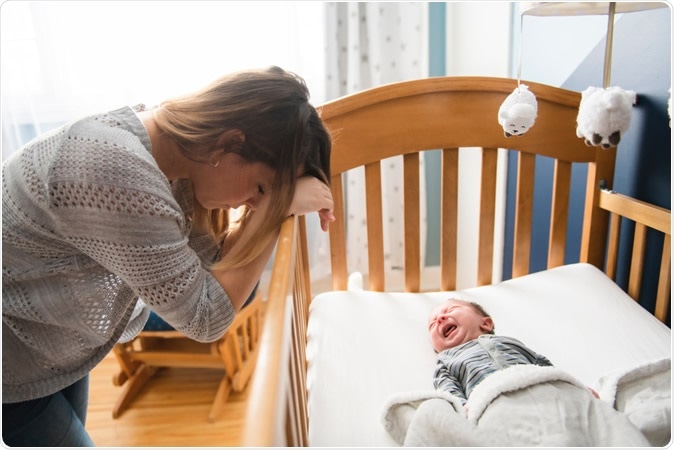Researchers from the University of Birmingham have found that infants that have sleep problems may have emotional and behavioral issues as they grow into toddlers. Their study titled, “Parent-reported early sleep problems and internalizing, externalizing, and dysregulation symptoms in toddlers”, was published in the latest issue of the BMJ Paediatrics Open.

Image Credit: Lopolo / Shutterstock
The team of researchers at the Institute for Mental Health, along with those at Finnish Institute for Health and Welfare, in Helsinki believe that behavioral problems and emotional problems such as depression and anxiety in toddlers may be linked to sleep problems in infants. Their study emphasizes that these sleep problems need to be addressed in infants. This is the first study that showed an association between sleep problems faced during infancy and problems later in childhood.
What was done?
The researchers looked at sleep factors in infants, including short sleep duration, frequent night awakenings, difficulty in falling asleep, or staying asleep among infants. They noted the association of these factors with emotional and behavioral problems at the age of 24 months.
For this study, they provided the parents with two sleep questionnaires. The children and the parents enrolled in the study belonged to a birth cohort group called the CHILD-SLEEP birth-cohort that is based in southern Finland. There were nearly 1,700 parents who completed the baseline questionnaire that was provided to them at 3, 8, 18, and 24 months of age of their baby. Yet another questionnaire was given to them regarding behavioral problems and emotional problems in their child aged 24 months. This was completed by 950 parents. The two questionnaires were compared to find an association between sleep problems in the infant and behavioral or emotional problems in the toddler.
What was found?
Results revealed that babies at 3 months that had a higher number of awakenings per night had a greater risk of problems related to emotional and behavioral control as toddlers. The researchers wrote that they had problems with self-regulation. Babies that had short sleep duration or those that took longer to fall asleep or awoke frequently at different stages of infancy also had emotional and behavioral difficulties at 24 months of age. This led to temper tantrums and disruptive behaviors and emotions, they explained.
Impact of the study and future directions –
According to lead researcher Dr. Isabel Morales-Muñoz, “Our results show that infants who sleep for shorter periods of time, take longer to fall asleep and wake up more frequently during the night are more likely to show emotional and behavioral problems in later stages of childhood. It's likely that sleep quality in these early months and the development of self-regulation - the ability to control our behavior - are closely intertwined.” She added that there are several factors at play here, and these are genetic as well as environmental. She added, “Scientists think there are links in the central nervous system between sleep-wake behavior and our emotions, and so it's possible these links have a biological basis. Environmental factors, such as sleeping practices in the family, parental reactions to crying, and parental stress, also play an important part in a child's sleep and socioemotional development.”
Dr. Morales-Muñoz concluded, “Although more research needs to be done in this area, we think early interventions in infants experiencing these sleep problems could be really beneficial and help very young children develop their behavioral and emotional self-control.”
Related study
Yet another study was released this week on the same premise. This study revealed that sleep problems in the first year of life could raise the risk of the development of anxiety and emotional problems during childhood. This study was published in the latest issue of the Archives of Disease in Childhood.
This study showed that 19 percent of all infants below the age of 12 months have sleep problems, which include difficulty in falling asleep without parental help, short sleep duration, and frequent waking. For this study, the team looked at 1,507 children and their first-time mothers in Australia.
There were four interviews with the mother, at 3 months, 6 months, 9 months and 12 months. The ninth month interview was conducted face to face; the remainder were online. The mental health of the child was checked again at 4 and 10 years of age. Questionnaires used were DAWBA and SDQ. At 10 years of age, the parents answered the Spence Children's Anxiety Scale for Parents. The final data was gathered from 1,460 mother-infant pairs.
Results revealed that sleep problems were persistently severe in 19.5 percent of infants, moderately severe or fluctuating in 56 percent babies and “settled” or absent in 25 percent babies. Those with problematic sleep had a raised risk of childhood anxiety and emotional problems. The risk of these problems at 4 years of age was three-fold higher among those with severe sleep problems compared to those that were settled. These children were also more likely to satisfy the diagnostic criteria for emotional problems at the age of 10 years. Some of the problems found included anxiety, depression, bipolar disorder, post-traumatic stress disorder, panic disorder, social or agoraphobia, separation anxiety, obsessive-compulsive disorder, etc.
The researchers concluded, “Persistent disturbed sleep during infancy may be an early indicator of a child's heightened susceptibility to later mental health difficulties--in particular, anxiety problems. Infants with persistent severe sleep problems should be monitored for emerging mental health difficulties during childhood". The experts, however, warn that this was a preliminary study with single children, and more needs to be explored before concrete conclusions are drawn from this study.
Journal references:
Morales-Muñoz I, Lemola S, Saarenpää-Heikkilä O, et al, Parent-reported early sleep problems and internalising, externalising and dysregulation symptoms in toddlers, BMJ Paediatrics Open 2020;4:e000622. doi: 10.1136/bmjpo-2019-000622
Cook F, Conway LJ, Giallo R, et al, Infant sleep and child mental health: a longitudinal investigation, Archives of Disease in Childhood, Published Online First: 09 March 2020. doi: 10.1136/archdischild-2019-318014